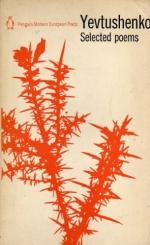|
This section contains 1,123 words (approx. 4 pages at 300 words per page) |

|
SOURCE: "Perestroika Redefines the Poet's Role," in The Christian Science Monitor, March 8, 1991, p. 11.
In the following essay, Kidder expresses Yevtushenko's concerns about the state of Russian politics, poetry, and attitudes toward indigenous cultural traditions in the era of perestroika.
Yevgeny Yevtushenko is a man at a crossroads. Still one of the Soviet Union's best-known poets, he treats each conversation almost like a performance—arms flying to emphasize his points, metaphors abounding in a rush of language, political opinions jostling with personal probings. To talk with him is to see poetry being made while you watch.
But in the past few years, something odd has been happening. The traditional elements of his brand of Russian poetry—the high oratory, detailed allegory, vivid metaphor, and direct syntax of verse forms meant to be heard as much as read—are still there. What has changed is the context. Under Mikhail Gorbachev's...
|
This section contains 1,123 words (approx. 4 pages at 300 words per page) |

|


